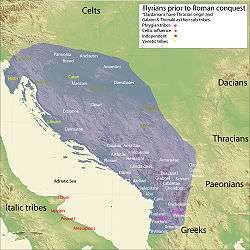
Illyria
In classical antiquity, Illyria (Ancient Greek: Ἰλλυρία or Ἰλλυρίς,Latin: Illyria, see also Illyricum) was a region in the western part of the Balkan Peninsula inhabited by the Illyrians.
The prehistory of Illyria and the Illyrians is known from archaeological evidence. The Romans conquered the region in 168 BC in the aftermath of the Illyrian Wars.
The Roman term Illyris (distinct from Illyria) was sometimes used to define an area north of the Aous valley, most notably Illyris proper.
Mythology
In Greek mythology, the name of Illyria is aetiologically traced to Illyrius, the son of Cadmus and Harmonia, who eventually ruled Illyria and became the eponymous ancestor of the Illyrians. A later version of the myth identifies Polyphemus and Galatea as parents of Celtus, Galas and Illyrius. The second myth could stem perhaps from the similarities to Celts and Gauls.
Kingdoms
The earliest recorded Illyrian kingdom was that of the Enchele in the 8th century BC. The era in which we observe other Illyrian kingdoms begins approximately at 400 BC and ends at 167 BC. The Autariatae under Pleurias (337 BC) were considered to have been a kingdom. The Kingdom of the Ardiaei began at 230 BC and ended at 167 BC. The most notable Illyrian kingdoms and dynasties were those of Bardyllis of the Dardani and of Agron of the Ardiaei who created the last and best-known Illyrian kingdom. Agron ruled over the Ardiaei and had extended his rule to other tribes as well. As for the Dardanians, they always had separate domains from the rest of the Illyrians.
Illyria (village)
Illyria (Ukrainian: Іллірія) is a village in the Lutuhyne Raion of Luhansk Oblast in southeastern Ukraine. The population of Illyria is 646 people.
Coordinates: 48°24′11″N 38°59′35″E / 48.40306°N 38.99306°E / 48.40306; 38.99306

Illyria (Angel)
Illyria is a fictional character created by Joss Whedon for the television series Angel. The character is portrayed by Amy Acker. She is a regular during the last third of season five. The character is introduced in a story where main character Fred Burkle dies of a mysterious infection, after which her dead body becomes the host of an ancient demon, Illyria, who once ruled the world but now finds she has outlived her kingdom. Subsequent episodes featuring Illyria document her struggle with adapting to the human condition, Fred's memories, and the continuing grief of Fred's friends and loved ones, who make up the central cast of the show.
Though the character only appeared in the final episodes of Angel's final season, the character appears heavily in various official and unofficial comic book continuations of the show, including licensed fictional crossover stories where Illyria is the only character from the Buffy the Vampire Slayer television franchise to appear. The character has also been subject to analysis from academics, several of whom frame the story of Fred's death using feminist film theory.
Podcasts:
Illyria
ALBUMS
- Burque Luv Volume 5 [Left] released: 2003

Latest News for: illyria
Saint Eleutherius of Illyria (18 April): Butler's Lives of the Saints
- 1
